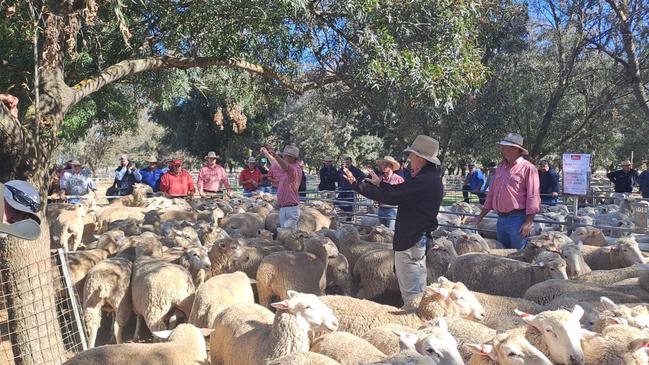Why Deniliquin’s sheep sale was tough for vendors: analysis here
The Riverina is renowned for producing good sheep but that reputation was not enough to keep prices up at Deniliquin.
Much cheaper prices at today’s store sheep sale at Deniliquin in southern NSW showed how buyer confidence has ebbed out of the market.
Scanned-in-lamb Merino ewes sold from $60 to a top of $180 with sales above $130 limited. Merino wether lambs went from $20 to a peak of $100, with a lot of sales from $30 to $80.
Some sheep were passed-in and several lines of Merino ewes were destined for mutton processing after auctioneers struggled to find them homes even at the low price rates.
The subdued price results came as a yarding of 20,126 sheep tested the market and found considerable gaps in demand for what were mostly ‘opportunity’ or trading type sheep rather than ‘front paddock’ quality.

Only a small crowd followed the sale, and there were no meat buyers in attendance.
While auctioneers admitted they had “braced’’ for a tough day, it proved more difficult than they had anticipated.
The reasons put forward for the lack of demand were varied, but had a common theme of farmers being disenchanted with the recent performance of the lamb and mutton markets, which has been erratic; the season still being on a knife’s edge in many grazing areas that would usually handle this type of surplus sheep; people being spooked by reports of a dry winter and spring; and the lure of cropping money ahead of running stock.
It had all combined to strip buyer confidence away from the market.
“No-one has any passion for the (sheep) job at the moment,’’ Elders Wycheproof’s Kevin Thompson said, someone who is a regular follower of the store sheep industry in the south.
It was a comment mirrored by local breeder Ken Crossley, Kaunda, who offered a line of young first-cross ewes that were passed in after bidding for the tops stalled at $178 for well-grown yearlings.
“There is just no confidence out there for sheep or cattle at the moment, that is problem,’’ he said.
“The lamb job hasn’t been great and all these weather forecasts are predicting it to go dry and so everyone is uncertain about what is ahead.’’

For those who did purchase, they agreed prices at Deniliquin looked in their favour.
Mallee agent Patrick ‘Paddy’ O’Reilly, Nutrien, paid $46 for the biggest line of Merino lambs offered in the auction – 2956 May/June drop January-shorn lambs from the big run off local station Cooinbil, operated by Paraway Pastoral.
The lambs will go into a feedlot before being shorn and targeted at the late winter lamb market, with the other option being to sell them as young store wethers in the early spring.
“If we can’t make money out of these the whole job is up the s..t,’’ he said.
Also optimistic of a decent return was agent Lachie Wilkinson, DMB Nhill, who paid from $60 to $120 as he put together 600 older scanned in lamb Merino ewes, due to lamb to Dohne Merino rams. They were part of Cooinbil, which was the volume vendor of the sale.
“To me there has to be plenty of money in them,’’ he said, after estimating that some pens should be able to get their value back as mutton with the resulting lambs essentially free.
The top price of the yarding was $190 for 241 April/May 22 drop first-cross ewes from Bunderlong. They were November-shorn and presented well, only being in the market due to the loss of a lease paddock.
The best price for Merino ewes was $180 for 99 young ewes that were June/July 21-drop, August shorn so nearing full wool, and scanned in lamb to Poll Dorset lambs.
The big Cooinbil run of Merino ewes reached $162 for the opening pen of 455 three-year-olds that were March shorn and scanned in lamb to Dohne rams after being joined on February 1.




